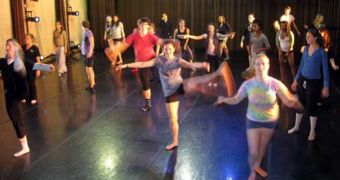In a new study, researchers discovered that the way people dance holds clues to some long-standing personality traits that are unique to each individual. In this sense, one may be able to tell a lot about a person by simply watching them dance.
The research was built on previous investigations, which showed that the way people move to music can be used to determine their level of self-confidence.
But this work is the first to demonstrate that dance can be used as an indicator to someone's stable, long-term personality. The study was conducted by music researcher Geoffrey Luck, who is based at the University of Jyväskylä, in Finland.
“This is the first study to show connections between long-term stable personality traits and the way people move to music,” the team leader says.
In a series of experimental lab setups, some 60 test subjects were divided into two groups, based on their stable personality types. This was done by applying the Big Five Inventory.
This is a type of questionnaire that is very often used to study personality traits such as openness, conscientiousness, extroversion, agreeableness and neuroticism.
After forming the groups, participants were played 30 song bits from jazz, Latino, techno, pop, rock and funk, and asked to move whichever way they felt most comfortable with.
An eight-camera optical motion-capture system was used to watch their movements, and to determine whether distinguishable personality traits can be linked with dance movement patterns.
The results were obvious. “Individuals scoring highly on extroversion and agreeableness both waved their hands around a lot, while individuals scoring highly on neuroticism did not,” Luck says.
But not everyone is convinced that these conclusions can be used to define someone's personality. The issue is a lot more complex, and only generalities can be teased out by watching dance.
“What is being revealed by the body can be a carefully constructed response based on artistic or culturally determined view of the music,” says Northwestern University dance professor Susan Lee.
“That does not mean it is revealing their personality. Dance therapists would also argue that such analysis is much more complex,” adds the professor, who is also an educational psychologist.
“I find this work interesting, but not readily generalizable on any significant level,” she goes on to say.
Luck concedes the point, but argues instead that his research could be used as a starting point for developing more thorough investigations.
“Personality so fundamentally influences everyday cognitions, motivations and behaviors. Music and movement are so pervasive in daily life, I think this study offers interesting insights into aspects of life that everyone can relate to,” he concludes.

 14 DAY TRIAL //
14 DAY TRIAL //